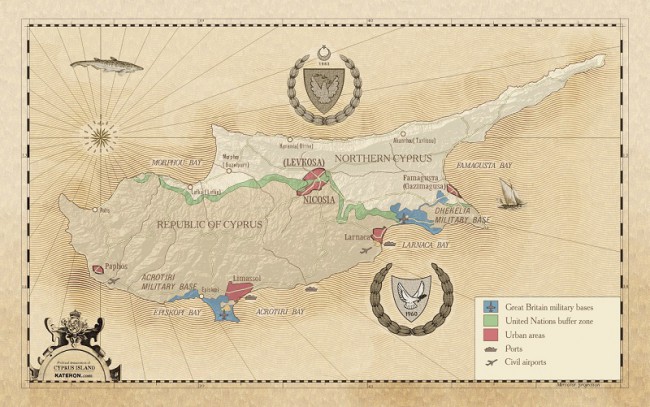The prospect of Cyprus joining the North Atlantic Treaty Organization (NATO) has sparked debate about its potential to resolve the island’s decades-long division and promote stability in the Eastern Mediterranean. While this initiative offers a historical opportunity, it also serves as a stark reminder of a missed chance when Cyprus was admitted to the European Union in 2004 without first addressing the conflict between the Greek Cypriot south and the Turkish Cypriot north. NATO membership now stands as a renewed possibility to rectify past mistakes and pave the way for permanent peace.
A Second Historical Opportunity
The accession of Cyprus to NATO, unlike its EU membership, could be tied directly to a settlement of the island’s division. NATO’s principles of collective security and shared defense necessitate collaboration between member states, making unity a practical requirement. Proponents argue that NATO membership would encourage cooperation between the two communities by integrating them into a common security framework, fostering trust and dialogue.
In 2004, Cyprus’s EU membership was granted without resolving the island’s division, a decision that entrenched geopolitical tensions and left the Turkish Cypriot community politically marginalized. NATO membership presents an opportunity to avoid repeating this mistake by ensuring that progress toward reunification is a prerequisite for accession.
Regional Stability and Security
Cyprus’s strategic location in the Eastern Mediterranean positions it as a key player in regional stability. NATO membership would enhance the island’s role in collective security initiatives, addressing not only its internal issues but also broader challenges such as maritime disputes, energy competition, and tensions between Greece and Turkey.
NATO’s structure could provide a platform for mitigating Greek-Turkish disputes over Cyprus. By including both countries in a unified alliance framework with shared obligations, NATO could facilitate dialogue and reduce the risk of conflict.
Cyprus’s potential membership in the North Atlantic Treaty Organization (NATO) presents not only a chance to address the island’s long-standing division but also a broader opportunity to stabilize the Eastern Mediterranean, mend ties between Greece and Turkey, and strengthen NATO’s collective defense against rising global threats from Russia and China. While this initiative offers a historical second chance, it also underscores the importance of addressing geopolitical tensions in a way that enhances both regional and international security.
By easing tensions between Greece and Turkey, NATO could focus its collective efforts on strategic priorities, rather than internal disputes. A more cohesive NATO would not only enhance its credibility but also ensure its capacity to address external threats, particularly from Russia and China.
The resolution of the Cyprus issue and the integration of the island into NATO could bolster the alliance’s position in the Eastern Mediterranean, a region of strategic importance in the competition with Russia and China. The Eastern Mediterranean serves as a critical corridor for energy resources, maritime trade, and military operations, making stability in the region vital to NATO’s broader objectives.
Challenges to Overcome
As with EU membership, Cyprus’s path to NATO accession is not without obstacles. Turkey, a NATO member, has veto power and remains opposed to Cyprus joining the alliance without a resolution to the island’s division. Ankara has consistently argued that unilateral actions by the Greek Cypriot administration undermine the rights of the Turkish Cypriot community and threaten regional stability.
However, some analysts suggest that Turkey’s stance could shift if NATO membership were part of a broader settlement that addresses Turkish Cypriot security concerns and ensures equitable governance on the island. Unlike the EU’s decision in 2004, NATO could leverage its requirements for consensus and collaboration to create the conditions for a comprehensive resolution.
Building on Lessons from the EU
The EU’s decision to admit Cyprus without resolving its division left lasting consequences. It granted the Greek Cypriot administration significant leverage, sidelined Turkish Cypriots, and strained EU-Turkey relations. NATO membership offers a chance to avoid similar pitfalls by using the process as an incentive for compromise and reconciliation.
A reunified Cyprus within NATO could benefit all parties. Greek and Turkish Cypriots would share the security and economic advantages of NATO integration, while Turkey’s inclusion in the process would strengthen its relationship with the alliance and its role in regional stability.
A Vision for Peace and Unity
Cyprus’s NATO membership could become a milestone for peace, offering a framework to resolve historical grievances and foster collaboration. The lessons of 2004 remind us that opportunities for progress must be tied to tangible steps toward resolution. By linking NATO accession to a settlement of the island’s division, Cyprus has the chance to turn a missed opportunity into a success story of unity and shared security.
As Cyprus seeks greater integration into Western defense and security structures, this moment could redefine its future. With the right diplomatic efforts, NATO membership could transform Cyprus from a symbol of division to a model of reconciliation, ensuring lasting peace for the island and stability for the region.
Final Assessment
Cyprus’s NATO membership represents more than just a solution to a local conflict—it is an opportunity to reshape the geopolitics of the Eastern Mediterranean, strengthen alliances, and bolster NATO’s ability to address global challenges. By tying membership to a resolution of the Cyprus issue, NATO can not only redeem a missed opportunity from the past but also secure a brighter, more stable future for the region and the alliance as a whole. This moment could redefine Cyprus’s role on the global stage, turning it from a symbol of division into a cornerstone of peace and security.
By: NAT Editorial Team



